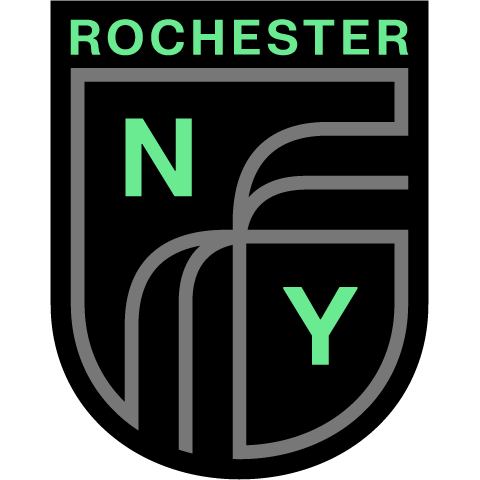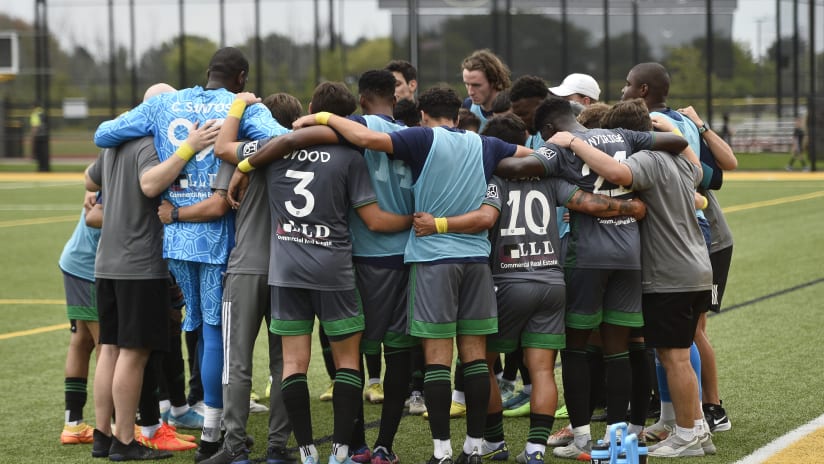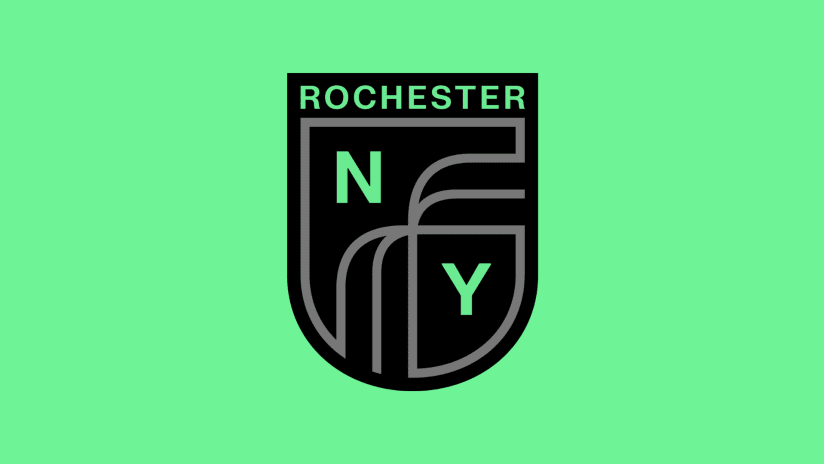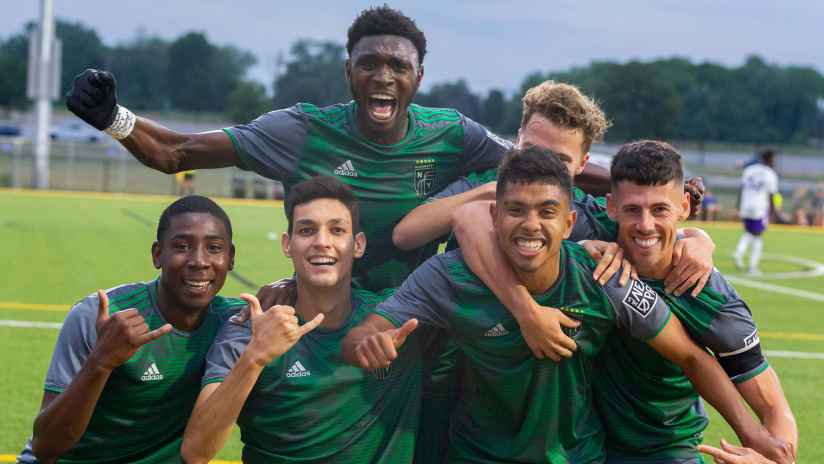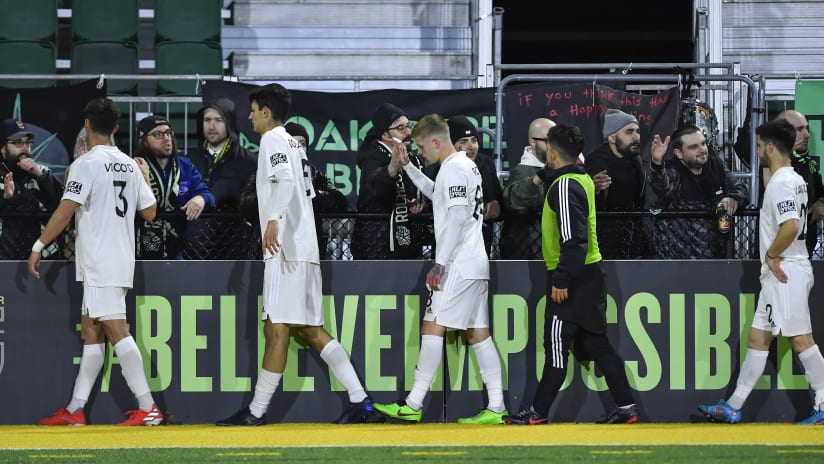A Team with a Rich History - Toluwa Famuyide
Creating historic moments on the pitch is the pinnacle for professional soccer teams, and numerous generations of fans understand the abundance of history that resides in Rochester. As the club surpasses more than half a century of success on the pitch, the current group of players is aware that, while the potential is unlimited, they can play because of the club’s history.
Commonly referred to as the godfather of Rochester soccer, Pat Ercoli led the charge for the Rochester Raging Rhinos from 1996-2004 and established its credibility among America’s elite in 1999. That year ultimately culminated in one of the most remarkable Cinderella stories in U.S. soccer, but times were not always so triumphant.
Ercoli’s playing career started in Canada, where he made a name for himself at Toronto Italia and the Montreal Castors in the mid-1970s. Those performances earned him the right to play for Rochester’s main soccer team, the Rochester Lancers.
Although he was only at the club for three seasons, Ercoli managed to abide his trade against the likes of Pele, Franz Beckenbauer and other stars of world football.
The original Lancers managed great success in the early 70s, winning an NASL championship and becoming the only NASL team to compete in the 1971 Concacaf Champions Cup. That early success quickly dwindled, however, and although resources were constantly poured into the club, results on the pitch told a different story. The club ceased to exist a year after Ercoli’s departure in 1980.
Thirteen years would pass before Ercoli would find his way back onto the field but in a different role. Ercoli had long since retired but remained active in the sport, playing in recreational indoor leagues to feed his passion. By then, he owned a plethora of businesses in Canandaigua, New York, close to Finger Lakes Community College (FLCC).
He noticed that FLCC’s soccer team was not performing well and wanted to offer the team some experience. “I approached the coach a year prior and he had no interest in having me come in as an assistant coach,” he said. “They had a Brazilian player on the team who heard that I had asked, and he must have done his research on me, and basically told the coach he’s crazy.”
After the head coach paid a quick visit to Ercoli’s car wash business, the latter began his role as assistant coach of FLCC. After helping drive them to a playoff berth, it was time for a new challenge. Monroe Community College was the next pitstop in his coaching career, yet it would only last for a year.
In 1995, talks of a new soccer organization coming to Rochester were making waves. There was no better candidate to lead the team than Ercoli, and he was named head coach that year. In his first year, things didn’t start particularly well.
“We started off the season 2 and 8 and we almost didn’t make the playoffs,” he said laughing. “We went to Hershey for the last game of the year, and the field was all dirt. I had at least 4 or 5 players that were stars on the indoor scene. I knew they were going to be reporting back to indoor soon and I wasn’t going to force them to play on that field; but they all played, we won the game and made the playoffs.”
Those are the moments that birth champions, and in his first year, Ercoli and the Raging Rhinos participated in both the A-League Championship match and the final of the U.S. Open Cup. Even though there would not be silverware in his first year, Ercoli knew that the Rhinos had a winning spirit.
Considerable squad changes allowed Ercoli and the Raging Rhinos to push even harder for league and cup success, and from 1998 to 2001, the Raging Rhinos didn’t know what it meant to end a season without silverware. The famous 1999 Open Cup victory was the pick of the bunch, as Rochester slayed four Major League Soccer teams on the way to lifting the cup.
Great things don’t last forever. After 2004, Ercoli’s contract was up, and there was no hope for renewal. The team, having found new management, would yet again make another final in 2005, but silverware wouldn’t follow.
A shift in ownership also ensued, with Utica businessman Rob Clark taking over the club. He changed the team’s name to the Rochester Rhinos and assured fans that financially the club was stable. Several years would go by with the Rhinos trying to remain competitive. However, results on the pitch were mixed, and issues with Clark’s ownership did not make things better.
In 2016, the city of Rochester revoked Clark’s ownership along with the club’s lease for the Rochester Rhinos stadium.
The Dworkin’s purchase of the team – How and Why - Toluwa Famuyide
Somewhere among David and Wendy Dworkin’s myriad of investments and projects lies the rejuvenation of a crown jewel in Rochester. The pair are entwined in preserving NBA history over in Sacramento, but more than 2,500 miles away the task is slightly different.
Rochester has long been regarded as a vibrant soccer city, boasting countless organizations beyond the Lancers and Rhinos. Unwilling to let the legacy of the Rhinos falter, the Dworkins needed to make a pivotal decision. They knew they had to become what the previous owner could not: a cornerstone.
In January of 2016, they acquired the Rhinos off the back of the club’s first-ever United Soccer League (USL) championship the year prior. Despite being consistent playoff contenders, something felt off.
Forty-five days until the start of the 2016 season and their cognitive printer had almost run out of paper. There did not seem to be an end to the number of tasks they needed to fulfill before the first matchup. “There really wasn’t any one thing that was completed settled,” David Dworkin said. “Every single thing needed to be taken care of, every single piece needed to have our fingerprints on it.”
Everything from fielding players and obtaining licenses, to the countless hours spent on lease agreements and approvals from the USL. The Dworkin's were up to the challenge, but the challenge was more intricate than initially perceived. Their vision to protect and cultivate the franchise was not heading in the direction they intended, but for the city of Rochester, they were not prepared to lose hope.
Taking over the club was never meant to be a short race. There certainly wasn’t a lack of application by the Dworkin's to bring life back into the organization, but there were still many hurdles to overcome. By the end of 2017, dwindling attendance figures brought forth a million-dollar problem.
Attempts to raise funds from supporters were unsuccessful and, unable to recuperate the funds needed, the Rochester Rhinos had to vacate their position in the USL.
Forced to respond, time was afforded to the club, or as Mr. Dworkin says, a proverbial hiatus. The wheels were set in motion faster than the eye could blink.
Finding a suitable stadium to call home was first on the agenda. The Rochester Rhinos Stadium, which went through multiple name changes, was no longer a suitable home for the club. After striking a strategic deal to merge forces with Empire United soccer club, there was an expectation that the Rhinos could utilize those facilities.
The Dworkins wanted there to be an atmosphere inside the ground, something that couldn’t be achieved in a stadium with 13,000 seats. Opting for something smaller, Monroe Community College’s John L. Dimarco Field was a suitable option, in terms of location and size.
Jamie Vardy Buys In - Joey Semel
Jamie Vardy is a very busy man. Training every day. Multiple matches a week, not just in England, but across Europe.
But rest assured, Vardy, one of the top strikers in England’s Premier League, is not a passive owner of RNY FC. He talks to his fellow owners, the Dworkins, at least once a week, usually more. Sporting Director Lee Tucker hears from him just as often. He’s done calls with players when they sign, even fans to encourage their support.
It’s a call with fans that sticks out to the Dworkins.
“When we were contemplating what our brand was going to be, we had a series of Zoom calls with different sections of our fan base,” David Dworkin said. “But I had planned for Jamie to hop on. And, you know, we're going through the whole thing and we had it all timed. And then Jamie hops on and you could see their faces just saying ‘holy hell, it’s Jamie Vardy.’”
According to Tucker, ownership, particularly in America, has always been something that has interested Vardy.
“The idea emerged from Jamie’s wife and his agent,” Tucker said. “He wanted to call a lot of the shots.”
When Vardy joined the club, the Rhinos hadn’t played a soccer match in nearly four years. Vardy hopping on board was a symbol that soccer was near. The fans felt vindicated for sticking through the layoff.
“It stirred up so much excitement,” Christian Damico, one of the leaders of the North Star Ultras, RNY FC’s fan group said. “It was really cool to hear someone like Jamie Vardy was attaching his name to the club that we’ve followed for a long time.”
David Dworkin agreed: “It was as if these supporters birthed Jamie Vardy,” he said.
But why Rochester? Why the MLS Next Pro? After all, this is Jamie freaking Vardy. Many clubs would have jumped at the opportunity to get him on board.
To understand those answers, it’s important to understand what makes Jamie Vardy, Jamie Vardy.
While Vardy has experienced incredible success with Leicester City, his path to that stage was different than most of the Premier League’s top strikers. After being released from Sheffield Wednesday’s youth team, he played in the lower tiers of English football for years before Leicester gave him a shot. Even then, Leicester was playing in the EFL Championship, the second tier of English soccer. Since then he’s been on teams that won the Premier League and the FA Cup. Individually, he’s led the Premier League in goals and been named Premier League Player of the Year.
But it’s his roots, before all of the success, that drew him to Rochester.
“Myself and Jamie’s agent, John [Morris] came out here in 2019,” Tucker said. “And we came back from this trip and said, ‘it’s Jamie’s type of place. It’s a great city. It’s got that grit about it.”
Since that time, Vardy has had his fingerprints all over the club in almost every aspect. It starts at the top with Tucker, who has spent years with Premier League clubs, but also working with V9 Academy, Vardy’s own project. The Academy aims to get players in the lower tiers of English football noticed by teams in the higher tiers.
That seems to be a trend in much of what Vardy does. Most of the players for RNY FC are represented by the same agency as Vardy. Many also have a lot in common with Vardy: It’s their second chance.
Take team captain Ed Williams for example. He played in the academy for Cheltenham Town, a team in the third tier of soccer in England. After that, he played for Gloucester City (sixth tier) and the Kidderminster Harriers (sixth tier).
He eventually found his way to the Doncaster Rovers, in the fourth tier, but was buried on the bench. Rochester represented a chance for Williams to revitalize his career and get minutes every match.
Sound familiar?
That’s not to say Williams will or won’t be the next Jamie Vardy. But Vardy knows firsthand how players with paths similar to his and Williams’ have that extra edge to them.
“[Ed] was the right type of person for us,” Tucker said.
While Vardy isn’t in Rochester -- after all, he’s got a season of his own to play -- he still follows the club closely and stays in touch with his fellow owners. And he has since day one.
David says Vardy interviewed every potential coach. And he offered a completely different perspective than what David and Wendy brought.
“Some of Jamie's probing questions were something I would never think to ask,” David said. “Jamie was probing and said, ‘look from a player's perspective, these are things that matter to players.’ And that brought a completely different discussion to an interview. Whereas I'll ask different questions because my head is wired to business.”
His involvement has also led to business opportunities most clubs in the league don’t have access to.
“It makes us known in England and Europe,” David Dworkin said. “We’ve spoken about potentially selling RNY FC jerseys in Leicester’s shop and conversely selling Leicester kits in America.”
Jamie’s involvement is also bringing new, potential partners to the club.
“Our director of global sponsorships and Leicester City's sponsorship folks have spoken more than once,” David Dworkin said. “About when [sponsors] renew [their] sponsorships, if you're an English brand that may have a presence in America or wants to, here's an ideal place for you to get a foothold if you wish to.”
In 2022, Jamie is bringing opportunities to a business thousands of miles away from his home in Leicester. But he’s still the same guy who was working in a factory to support his soccer career years ago.
Himself.
David and Wendy learned that the first time they met him.
“First time I've ever physically seen him or spoken to him and he has a beer in his hand,” David Dworkin said. “It wasn’t a high end, import beer. And I said, ‘is that your favorite beer?’ And he said ‘Nope, no. It was just on sale.’”
“His mind thinks that way. And that's what you want in a partner.”
The Mixed Bag of The Rebrand - Toluwa Famuyide
The Rochester Rhinos were still a recognizable organization in the midst of extinction; so much so that Mr. Dworkin was shocked when a certain individual from Europe happened to appear at his doorstep requesting to buy the team.
With all these changes taking place, the Rhinos needed a new face. “There were quite a number of people who were involved in the rebrand,” David Dworkin said. “Jamie was involved, and we also sought out the thoughts from our supporters and fanbase.”
After much deliberation, and wanting to pay homage to the city of Rochester, the team relaunched as Rochester New York Football Club in 2021.
The decision to bring the team back into MLS Next Pro as RNY FC did not go over entirely well, but there were cries for the club to move on from the “Raging Rhino” logo. The fan base was largely split. Some defended the move and others were strongly against it.
“I know certain people on social media that were always very negative and I know their names and I remember them,” David Dworkin said.
But other parts of the base stuck by the move: “Everything that they have said about, you know, defending us isn't the right word, but just clarifying things for people,” he added.
In order to appeal on a global scale, the Dworkins believed this was the right move at the right time. Going with a name that had FC at the end rather than a mascot connected with the team’s new owner.
Jamie Vardy’s influence was a large part of the rebrand. The European influence on the name and logo is easy to spot. But Vardy did more.
Not only was he key in spreading RNY FC’s reach to England and Europe, but he gifted the club with his own right hand man. Dr. Lee Tucker, who currently serves as the club’s sporting director, moved to Rochester to help construct the rebuild.
“We’re a new club basically,” Tucker said. “I know the Rhinos have been around for quite some time but through the hiatus it means we’ve restarted. When I got here it was only Pat and Greg Stanton working at the club. It was tough in the beginning but step by step we’ve been getting stronger, and I think we need to build upon that momentum.”
Tucker believes that a club’s logo should not be as important as the people within. “I’m not disputing the importance of the team name and logo because that will always be there, but for me it’s how we conduct ourselves on a daily basis with a bit of class that hopefully our fans and community can be proud of.”
This Season is Shaping the Future - Joey Semel
When you get on a rollercoaster, you know what to expect. Some high points. And some fast drops that lead to low ones.
Since announcing its official return to play, RNY FC has experienced the whole spectrum.
While most of the teams in the MLS Next Pro have been together for years, RNY FC was new. With the announcement of the league’s first season in December came the news that Rochester would be the first independent club.
That meant Rochester would be playing against MLS teams’ younger players. Their second teams. Those teams were already built.
Rochester had from December until the first games in March to build a coaching staff, a roster, and a front office. It also meant that Rochester’s players would have to be comfortable enough with each other to play a productive brand of soccer that would give the club a chance for success.
It meant that everyone had to step up. Oftentimes in roles they weren’t necessarily used to. That includes owners David and Wendy Dworkin.
“We've worked in the bar, we've worked in concession stands, we've worked in ticketing, we've worked on the suite level,” David Dworkin said. “My wife and I did the first go round of food server’s certification so that we were certified food handlers so that we could sit in the snack bar and understand what people were or were not doing correctly. I can talk to you about the danger zone of food that in 40 plus years of my life at that time, I knew nothing about the danger zone.”
“[We’re] willing to be part of the solution, not just expecting everyone else to solve the problem,” Wendy Dworkin said.
“But we’re a lot more careful going to restaurants,” she joked.
The biggest hurdle had to do with getting players (and coaches) to Rochester. Visa issues prevented easy access and a quick start for the team.
Perhaps the most consequential issue was that Manager Bruno Baltazar had visa issues. He couldn’t get his visa until a week before matches started. That meant he was starting from scratch with a team who had never played together before. A slow start to the season was almost expected.
And that’s exactly what happened.
The team stumbled out of the gate, going winless in its first seven matches. RNY squeaked out a couple of draws but had very little success. They scored just one goal in their first three matches.
But since then, it’s been a completely different club both on and off the pitch. They’ve won seven matches and have battled their way back into playoff position. They currently hold the No. 4 seed in the Eastern Conference and four teams make the playoffs. They’re just a point ahead of the fifth seed with a month to play, but the turnaround has been significant.
“I'm happy that we are as competitive as we are on the field, especially given how quickly the team had to come together and how difficult it was to get the visas,” Wendy said. “It's a really big deal to be this competitive your first year when you're going against teams that have been playing as a unit, some of their players since they've been teenagers.”
Success is something the ownership group expects even early in the process. They want the Rhinos’ rich history of success to carry over to RNY FC.
David put it very simply. He was quick to point out that, to his knowledge, the Rhinos have made the playoffs every year of their history.
“This club has a history of winning,” he said. “We would be very unhappy if we didn't make the playoffs because that is the standard that we expect for this club. And we've mentioned it to all of our technical folks. They all know that we've never not made the playoffs.”
They also know that it’s not going to be easy. The Dworkins took over in 2016, just before the Rhinos were put on hiatus. They’ve seen the downs. Right now they’re enjoying the ups, but for a club with big goals ahead, they know the work isn’t done.
“This is a club that has a phenomenal history, that has unfortunately had lots of ups and downs, and the downs aren't done,” David said. “I mean, this is not going to be an easy ride still.”
The Future is Bright - Joey Semel
The club has had some great success this season, but what does it mean going forward?
The first step for David and Wendy has to do with the larger Rochester community. Having lived here for years, it’s a community that they care about deeply. They want RNY FC to become a major part of that community.
“A minor league club, generally speaking, is a community club,” David Dworkin said. “We've always said that we're stewards of this asset and it's a community asset.”
While Dr. Tucker’s background is rooted in European football, the “Doctor” part of his name comes from working with community outreach. Outreach, particularly with youth soccer is something both the owners and the sporting director strive to do.
“Dr. Tucker is working with a woman named Nicole Hercules from the city of Rochester on youth city opportunities playing soccer. And again, that hits in his wheelhouse,” Wendy said.”
The major thing both groups are trying to do is slow down the pay-for-play model that youth soccer has here in America.
“Youth soccer in the U.S. is too much of a business,” Dr. Tucker said. “I wouldn’t say that [these academies] get the best players, they get the best players who can pay.”
“The whole culture that’s created around the system means you’re going to miss out on some players,” Dr. Tucker added.
Internally, the club has big goals as well. Improving the fan experience is one of those goals.
One of the major ones is adding a stadium. While Monroe Community College (MCC) has been a great host for the club, the Dworkins hope the team continues to grow. The stadium would come along with that growth.
“Once we feel that we've accomplished what we can accomplish at MCC, move on to a bigger facility that's still the right size for this community so we can have a different type of fan experience,” Wendy Dworkin said. “A bigger stadium that has more fan amenities.”
The Dworkins know the team is still in its early stages, but they’re always thinking about how to expand RNY FC’s reach.
As one of the few teams in America with direct connections to a club in Europe, it’s a great position to be in.
As for why you should get involved? The Dworkins see RNY FC as a chance to get involved with the soccer community beyond the MLS Next Pro.
“If someone wanted to connect with a club that is gritty, that has what we believe to be international appeal, and in a league that is the top league here, then, you know, we're your horse,” David said.
Wendy echoed that.
“It’s a great opportunity to be part of an organization that wants to be relevant in its community, relevant in the larger soccer community, you know, beyond Rochester and obviously abroad and in England and Europe,” she said.
